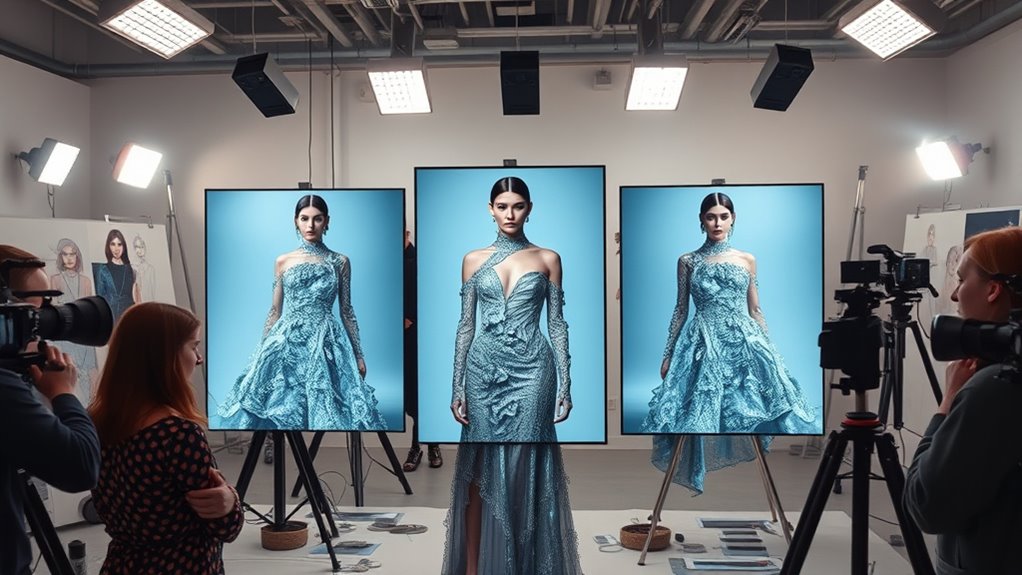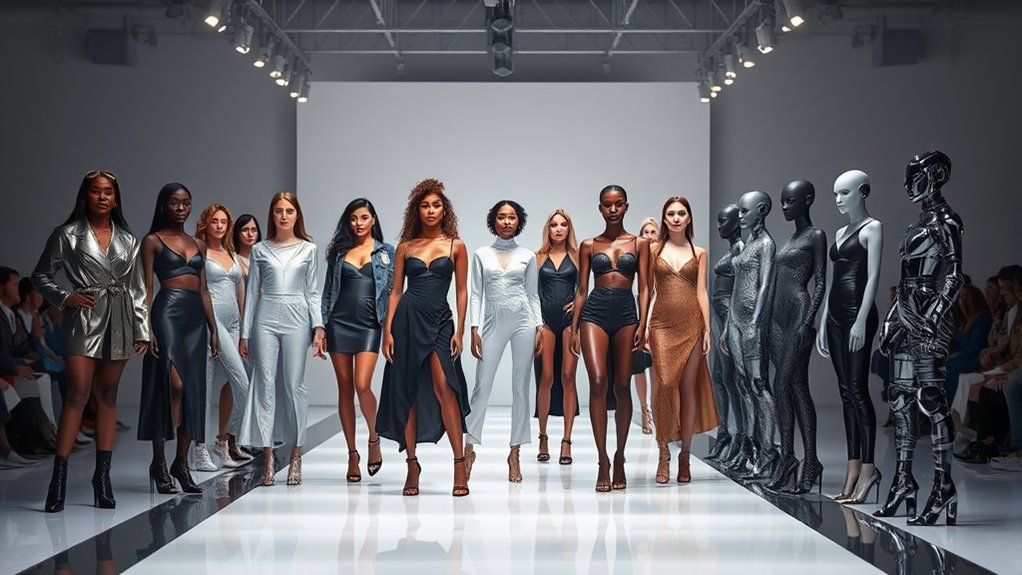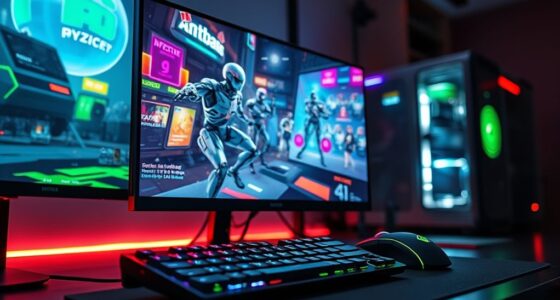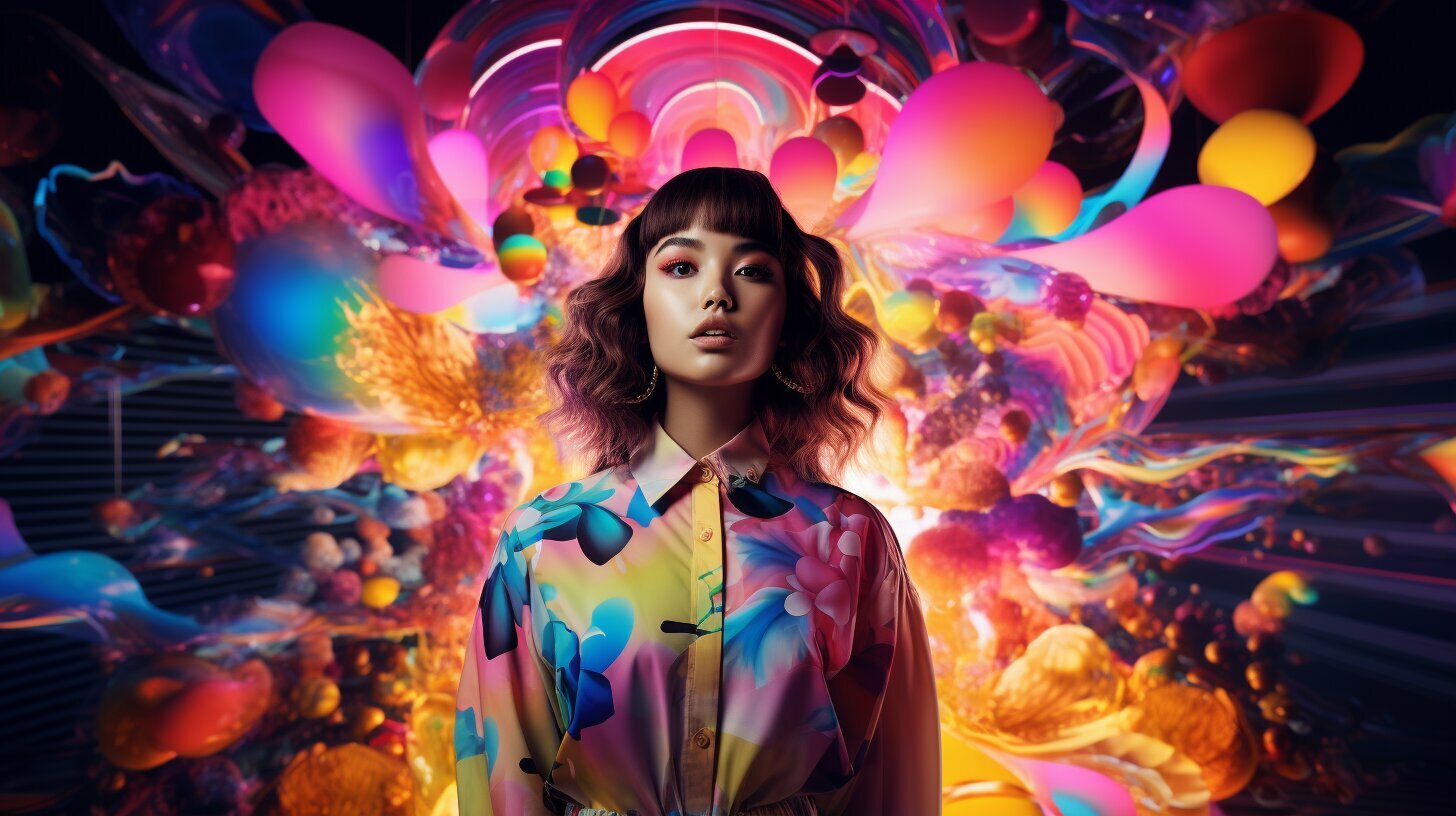You might feel surprised or even upset about Vogue using AI-generated models in their latest ad, as many in the fashion world are. Critics argue it challenges ideas of authenticity, diversity, and the value of human talent. Concerns about ethics, transparency, and unrealistic beauty standards also come into play. If you want to explore how this sparks debate about authenticity and industry ethics, keep exploring this evolving issue.
Key Takeaways
- Vogue’s use of AI models sparks outrage over replacing human talent and ethical concerns in the fashion industry.
- Critics argue AI models threaten authenticity, promote unrealistic beauty standards, and diminish diversity.
- Transparency debates arise over whether brands should disclose digital models to maintain consumer trust.
- The shift raises fears of devaluing real models’ livelihoods and eroding industry integrity.
- The controversy highlights broader tensions between innovation, societal perceptions of beauty, and ethical responsibilities.

The fashion industry is buzzing with outrage after Vogue revealed its latest ad featuring AI-generated models, sparking a fierce debate over authenticity and the future of modeling. As someone interested in fashion, you might feel surprised or even concerned about this shift. The use of AI models challenges traditional notions of beauty, diversity, and human talent, prompting critics to question whether this move is ethical. Many see it as a step away from real representation, raising ethical concerns about erasing human models and the stories behind them. When AI takes center stage, it blurs the lines between reality and digital creation, fueling authenticity debates that resonate deeply within the industry. Additionally, this development raises questions about the use of technology in fashion and its impact on creative expression. You might wonder if using AI models compromises authenticity. After all, fashion has long celebrated individuality, imperfections, and personal stories — elements that AI cannot genuinely replicate. Critics argue that AI models lack genuine emotion and lived experience, which are essential to creating authentic connections with audiences. When a digital model is designed to look perfect and unchanging, it risks promoting unrealistic beauty standards that can harm self-esteem and mental health. This move by Vogue could be seen as prioritizing aesthetic perfection over genuine diversity, further fueling concerns about superficiality in fashion.
Vogue’s AI models ignite debate over authenticity, ethics, and the future of real representation in fashion.
Moreover, the ethical questions extend beyond aesthetics. You may ask yourself whether relying on AI models undermines the work of real human models who depend on the industry for their livelihood. It also raises questions about transparency: should brands disclose when models are entirely digital? If consumers find out that models are AI-created, will they feel deceived or manipulated? These concerns touch on broader issues of honesty and responsibility in advertising, which are central to the ongoing authenticity debates.
While some might argue that AI models offer versatility, cost-effectiveness, and endless creative possibilities, others see this as a dangerous trend that could devalue human talent in the industry. As a viewer or consumer, you might feel conflicted — drawn to the innovation but wary of what it means for real people behind the scenes. The debate continues, with advocates claiming that AI can complement human models and push creative boundaries, while critics insist it risks eroding the genuine human element that has long defined fashion. Ultimately, this shift raises fundamental questions about authenticity, ethics, and the future of beauty standards — questions you’ll want to keep in mind as the industry evolves.
Frequently Asked Questions
Will AI Models Replace Human Models Permanently?
AI models are not likely to replace human models completely; they’re more like shadow puppets in a grand theater. You might use virtual fit technology and personalized styling options, but the human touch brings authenticity and emotional connection that AI can’t replicate. While AI can enhance fashion experiences, it won’t fully substitute the unique presence and creativity of human models, who bring life and relatability to every campaign.
How Do AI Models Impact Fashion Industry Employment?
AI models impact fashion industry employment by replacing some digital labor tasks, which may reduce opportunities for human models and designers. This shift raises questions about creative ethics, as it challenges the value of human creativity versus machine-generated visuals. You should consider how AI can complement, rather than replace, human talent, ensuring ethical practices that support diverse employment and preserve the artistic integrity of fashion.
Are AI Models Environmentally More Sustainable Than Traditional Models?
Imagine a time when models roamed the runway like ancient explorers, but now, AI models are more eco-friendly and sustainable. They require no travel, no wasteful photoshoots, and minimal energy compared to traditional models. This makes AI models a better fit for sustainable fashion, reducing your carbon footprint. They’re revolutionizing eco-friendly modeling, helping you embrace a future where style and sustainability go hand in hand effortlessly.
What Is the Public’s Reaction to Ai-Generated Fashion Advertisements?
You might notice that public reactions to AI-generated fashion ads are mixed. Many express ethical concerns, worried about AI replacing human models and impacting jobs. Others question the artistic authenticity, feeling AI can’t capture genuine creativity or emotion. While some embrace the innovation, others feel these ads lack the soul and originality of traditional campaigns. Overall, it sparks debate about technology’s role in fashion’s future.
Could AI Models Lead to Increased Counterfeit Fashion Content?
Think of AI models as a mirror that can reflect countless styles, but sometimes, that mirror can be easily cracked, leading to counterfeit fashion content. This risks digital authenticity, making it harder to trust genuine creations. You might find it challenging to distinguish real from fake, which harms creative authenticity. If unchecked, AI could flood the scene with imitations, diluting the unique value of authentic fashion and undermining trust.
Conclusion
You see, when technology steps into the fashion world, it sparks both excitement and controversy. While AI models bring innovation, they also raise questions about authenticity and artistry. Remember, a picture is worth a thousand words, but an authentic one speaks volumes. As Vogue pushes boundaries, you’ll want to stay true to what makes fashion special—real people, real stories. Change is inevitable, but holding onto authenticity keeps the soul alive.










